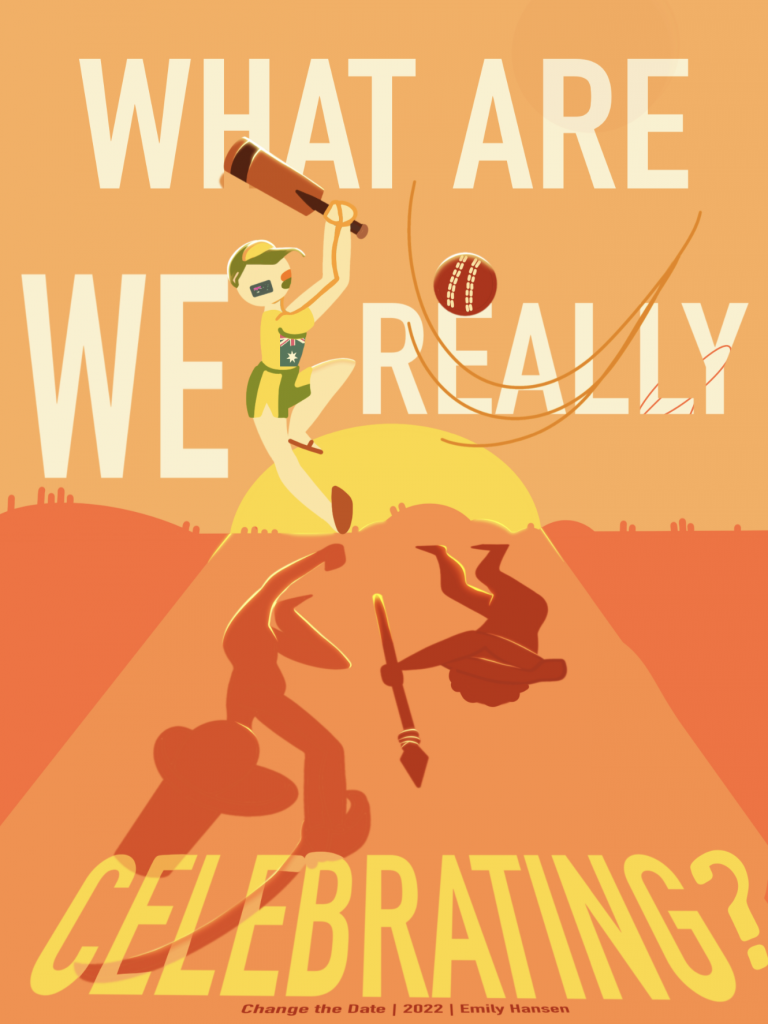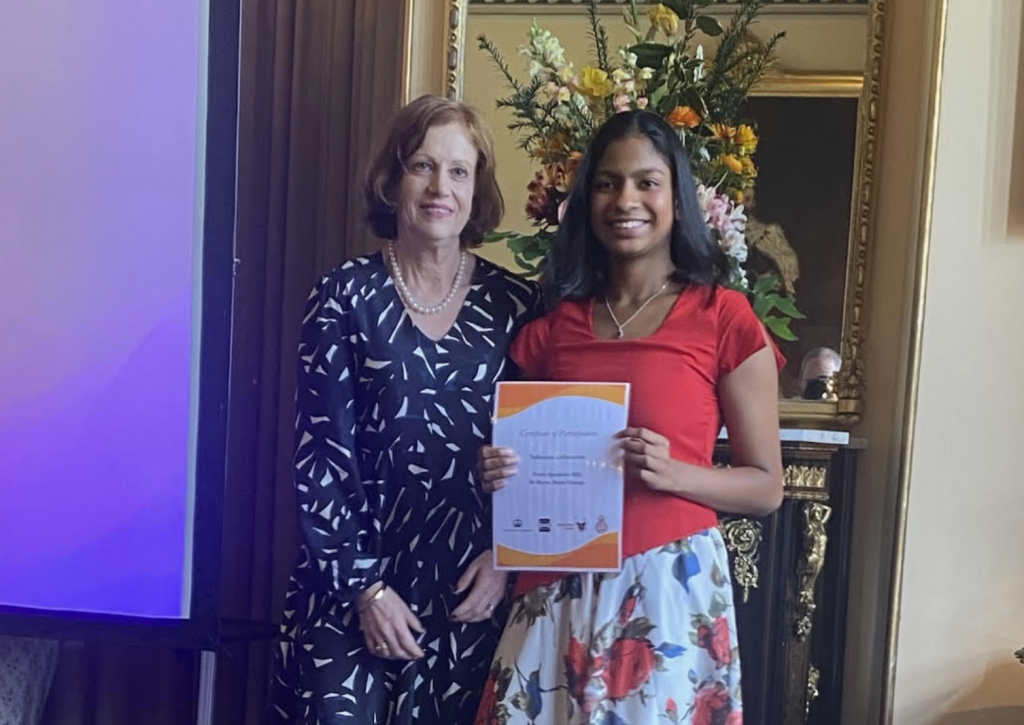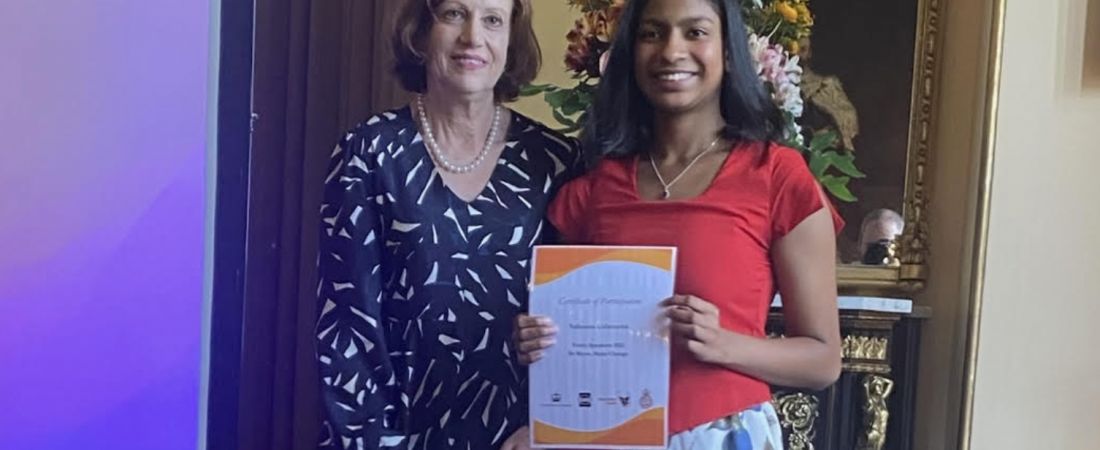Youth Speak Out
Posted on December 21, 2022
Youth Speak Out is a yearly event celebrating and expressing themes of Reconciliation by the next generation. Students from Years 5 to 12 are encouraged to enter with presentations and exhibitions in November in Hobart.
Youth Speak Out was suggested by Margaret Reynolds, herself a former Federal Minister, to give students a voice or a space to express their thoughts and ideas around Reconciliation. Students from Years 5 to 12 are invited to Hobart to present their pieces, meet the Premier and ministers and the Governor at Parliament and Government Houses, respectively.
This year two Friends’ students, Sahansa Udawatta (Year 10) and Emily Hansen (Year 9), were chosen to attend the Youth Speak Out Day at Government House. Sahansa presented her speech, The Voice of the Forgotten and Emily’s artwork (see below) was also recognised at the event.
Congratulations to both students for actively participating in this important initiative and being selected as finalists for Youth Speak Out 2022.


“The Voice of the Forgotten” by Sahansa Udawatta
When you are driving around our island home, have you ever seen any commemoration of the Aboriginal people and their contributions? Yet, when we go to Franklin Square we are reminded of the horrific actions of William Crowther, who in 1869 had the audacity to mutilate the body of Aboriginal man William Lanne. It is truths like this we so easily forget when confronted with so many everyday commemorative markers that celebrate European invasion. But, how can we continue to put a blanket over the truth just to make ourselves comfortable with the actions of our ancestors – the torture and torment they inflicted, the number of children they stole, the number of hearts they broke?
The truth is always a shadow at our side, haunting us. It is time we enter the darkness, to accept its presence.
The reality of the situation is that Aboriginal communities have had a sacred connection to this land, to its flora and fauna, for at least 60,000 years. They did not ask to be invaded by Captain James Cook in 1770, to wish to have their homeland infiltrated with the First Fleet in 1788, to have their people exiled to Flinders Island in 1846. These people were living a peaceful life before we came and tore their lives and livelihoods apart, creating war and robbing them of their rich cultures.
We must accept the truth instead of seeing the colonists as heroes of the British empire.
For centuries Aboriginal communities have been speaking out against the injustices we have inflicted on them, but we haven’t listened. Why did it take so long for Eddie Mabo to stake his birthright to the land? It is clear that his voice was just a whisper in the wind when in society competing priorities are privileged. Instead, we only care about reinforcing stereotypes of Aboriginality. We repeat statistics as if we are throwing away the value of the information and we use this information as a weapon to stereotype and perpetuate societal division. For example, 40% of Aboriginal men and 20% of Aboriginal women drink more than 13 drinks[1]; we know 30% of households suffer from income poverty[2]; we complacently accept they make up 29% of the prison population[3]; and we feel no guilt knowing that an Aboriginal person will die 9 years younger than us[4]. The Basic Cards we give them to ensure their access to essential resources and combat their descent into poverty and a lifetime in hospital are given not only out of the kindness of our hearts but our desire to control them financially.
All we seem to do is try to stop them from being a “burden” on the resources of our land and the wealth of our economy, but are our politicians so narrow-minded that they have lost any compassion? We merely rehearse the old structural racisms, however, we never slow down and remember the past. We never reflect and peel back the layers to question British intervention and oppression. The voice to parliament and the creation of an advisory body to assist in decision-making are formal manifestations of empowering Aboriginal citizens to have their voice heard. We must stop trying to further our own agendas and listen to them on a personal and political level, to empathise and understand their pain and the trauma that has misshapen them.
The truth is that without a treaty between the British colonists and the original custodians, we have built our societies around a web of lies upon stolen land. As the threads unravel, reconciliation is the only way to ensure the bonds of society remain intact. Acknowledging their right to ownership of the land and voting “yes” to the referendum to solidify their rights in the constitution is not enough to earn their forgiveness. We must consciously put in effort to know and understand the Aboriginal groups in our local areas and mobilise their language to ensure their cultures live on. We must stop seeing the deficits in human beings and value their contributions as it is their actions that have shaped our identity as individuals and collectively as a nation. Education and learning is the way to enact change as we venture upon the road to reconciliation. We must be brave to build a mutual understanding to fulfil the “Uluru Statement From The Heart”. We must be brave to attain a Makarata. We must be brave to make change and speak out when things we hear are flawed and harmful.
[1] Jens Korff, C. (2022) Aboriginal alcohol consumption, Creative Spirits. Available at: https://www.creativespirits.info/aboriginalculture/health/aboriginal-alcohol-consumption (Accessed: 21 September 2022).
[2] Chapter 13 – Indigenous Australians (2022). Available at: https://www.aph.gov.au/parliamentary_business/committees/senate/community_affairs/completed_inquiries/2002-04/poverty/report/c13#:~:text=About%2030%20per%20cent%20of,living%20below%20the%20poverty%20line. (Accessed: 16 September 2022).
[3] Australia’s First Nations incarceration epidemic: origins of overrepresentation and a path forward – UNAA (2021). Available at: https://www.unaa.org.au/2021/03/18/australias-first-nations-incarceration-epidemic-origins-of-overrepresentation-and-a-path-forward/#:~:text=Distressingly%2C%20the%20rate%20at%20which,of%20the%20adult%20prison%20population. (Accessed: 16 September 2022).
[4] Aboriginal and Torres Strait Islander people enjoy long and healthy lives (2022). Available at: https://www.pc.gov.au/closing-the-gap-data/dashboard/socioeconomic/outcome-area1#:~:text=Nationally%2C%20Aboriginal%20and%20Torres%20Strait,1 (Accessed: 21 September 2022).
